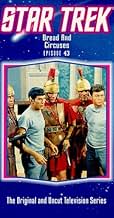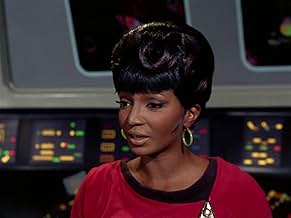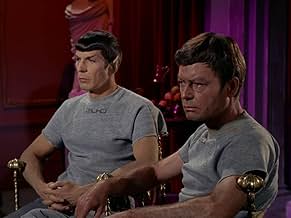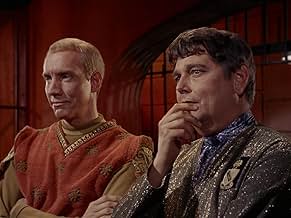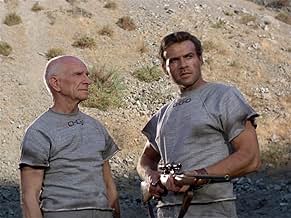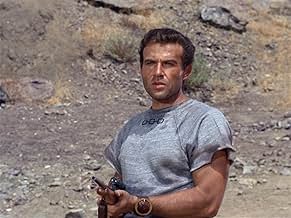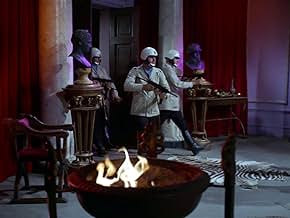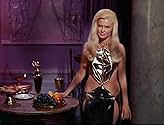Bread and Circuses
- Episode aired Mar 15, 1968
- TV-PG
- 50m
IMDb RATING
7.0/10
3.6K
YOUR RATING
The Enterprise crew investigates the disappearance of a ship's crew on a planet that is a modern version of the Roman Empire.The Enterprise crew investigates the disappearance of a ship's crew on a planet that is a modern version of the Roman Empire.The Enterprise crew investigates the disappearance of a ship's crew on a planet that is a modern version of the Roman Empire.
Bart La Rue
- Announcer
- (as Bart Larue)
Paul Baxley
- Policeman #1
- (uncredited)
Bill Blackburn
- Lieutenant Hadley
- (uncredited)
Frank da Vinci
- Lt. Brent
- (uncredited)
Featured reviews
Although Star Trek's "Prime Directive" had been mentioned in episodes prior to "Bread and Circuses", that philosophical tenet of the Star Trek universe is the focus of this episode, where it is fully laid out for the first time.
Captain Kirk and crew happen upon--what else--an Earth-like planet where Spock's research shows that another Starfleet ship was supposedly destroyed. Oddly, the planet also happens to have exactly the same land to water ratio as the Earth as well as the same chemical composition of air. Before beaming down they also intercept broadcasts that show the civilization to be a close parallel to ancient Rome--particularly in terms of a proclivity towards violence, including violence as entertainment. Of course, once they beam down, Kirk, Spock and McCoy end up as captives.
Enter the prime directive. There are probably not many reading this who are not familiar with it, but in a nutshell, it's a Starfleet philosophy of non-interference. In the course of their explorations, the aim is to study other civilizations, but to not take any actions which might amount to culture shock, and even more strongly, to not take any actions which might catalyze socio-cultural development in any directions other than what they would have been without interaction with Starfleet. Of course, there are a lot of problems with this idea, and even within the Star Trek world, Starfleet members are hardly consistent in applying the principle. We can safely guess that Star Trek writers tended to not be very familiar with ideas in science and philosophy of science which posit that any outsider interaction will necessarily affect the cultures being studied in some way, and they probably weren't very familiar with either chaos theory and the butterfly effect, or even Eugene Wigner's interpretation of quantum mechanics (in which the observer and his/her consciousness plays a significant role in the events that occur). But soundness of the Prime Directive in the real world aside, we receive a lesson in what it is and what it means to the Star Trek crew in "Bread and Circuses".
To an extent, I have to wonder if the Prime Directive wasn't further developed here in the way that it was merely as a plot device. It's a way of extending the conflict. Otherwise, the tendency is to think, "Why wouldn't Scotty send down crew members to just blast the hell out of Kirk, Spock and McCoy's captors?" Although the primitive culture had guns, they are still a primitive culture.
But it doesn't really matter if the Prime Directive is just a means of extending the dilemma for 40 minutes or so. The Prime Directive is a good idea; one that we can pretend is more sound in the Star Trek universe, and one that proved to be fruitful for many future episodes in different Star Trek series.
So this episode is both important and enjoyable. We get some different locations, some interesting one-time ideas--especially the televised gladiatorial events, and I always get a kick out of the fighting episodes. Part of the original Star Trek's charm is its cheesiness, and physical combat is one of the primary sources of cheese. Also notable are the unusual references to religion--this happens a few times in the series, but nowhere more strongly than this episode. There is also a lot of exquisite bickering between Spock and McCoy here, including McCoy mocking Spock's penchant for logic by making his own Spock-like statements and Spock responding by insulting McCoy's medical ability.
Captain Kirk and crew happen upon--what else--an Earth-like planet where Spock's research shows that another Starfleet ship was supposedly destroyed. Oddly, the planet also happens to have exactly the same land to water ratio as the Earth as well as the same chemical composition of air. Before beaming down they also intercept broadcasts that show the civilization to be a close parallel to ancient Rome--particularly in terms of a proclivity towards violence, including violence as entertainment. Of course, once they beam down, Kirk, Spock and McCoy end up as captives.
Enter the prime directive. There are probably not many reading this who are not familiar with it, but in a nutshell, it's a Starfleet philosophy of non-interference. In the course of their explorations, the aim is to study other civilizations, but to not take any actions which might amount to culture shock, and even more strongly, to not take any actions which might catalyze socio-cultural development in any directions other than what they would have been without interaction with Starfleet. Of course, there are a lot of problems with this idea, and even within the Star Trek world, Starfleet members are hardly consistent in applying the principle. We can safely guess that Star Trek writers tended to not be very familiar with ideas in science and philosophy of science which posit that any outsider interaction will necessarily affect the cultures being studied in some way, and they probably weren't very familiar with either chaos theory and the butterfly effect, or even Eugene Wigner's interpretation of quantum mechanics (in which the observer and his/her consciousness plays a significant role in the events that occur). But soundness of the Prime Directive in the real world aside, we receive a lesson in what it is and what it means to the Star Trek crew in "Bread and Circuses".
To an extent, I have to wonder if the Prime Directive wasn't further developed here in the way that it was merely as a plot device. It's a way of extending the conflict. Otherwise, the tendency is to think, "Why wouldn't Scotty send down crew members to just blast the hell out of Kirk, Spock and McCoy's captors?" Although the primitive culture had guns, they are still a primitive culture.
But it doesn't really matter if the Prime Directive is just a means of extending the dilemma for 40 minutes or so. The Prime Directive is a good idea; one that we can pretend is more sound in the Star Trek universe, and one that proved to be fruitful for many future episodes in different Star Trek series.
So this episode is both important and enjoyable. We get some different locations, some interesting one-time ideas--especially the televised gladiatorial events, and I always get a kick out of the fighting episodes. Part of the original Star Trek's charm is its cheesiness, and physical combat is one of the primary sources of cheese. Also notable are the unusual references to religion--this happens a few times in the series, but nowhere more strongly than this episode. There is also a lot of exquisite bickering between Spock and McCoy here, including McCoy mocking Spock's penchant for logic by making his own Spock-like statements and Spock responding by insulting McCoy's medical ability.
What makes this episode memorable to me after nearly forty years is not the tired, clumsy gladiator swordfights -- and certainly not the historically dubious tributes to Christianity as a religion of peace.
The power of this episode actually comes from the backstory of the minor villain, Merrick aka "Mericus." The real theme of this episode is the redemption of a man who once dreamed of being a Starship Captain, like Kirk, but was doomed by a single moment of cowardice to a lifetime of self-loathing. This is basically a retelling of LORD JIM by Joseph Conrad, with perhaps a dash of THE SHORT HAPPY LIFE OF FRANCES MACOMBER by Ernest Hemingway.
The clues come right away that Merrick is disgusted with himself. He's supposed to be questioning Kirk but really he's the one begging to be heard out, to be absolved. "Lots to talk about, Jim. Lots to explain." Later, when Kirk is absolutely ice-cold under pressure, watching Spock and McCoy face death in the arena, Merrick helpfully points out, "Proconsul, he commands not only a space ship, but a star ship. A very special ship, and crew. I once tried for such a command." Poor Merrick does everything but break down and bawl here. "I coulda been a contendah!"
The truly vile specimen in this episode is the proconsul, a fat little man who never gets tired of rubbing salt in Merrick's wounds. Watch how he makes Merrick pat Kirk down for weapons like a flunky. And listen for that little dig, "the thoughts of one man to another cannot possibly interest you, Merrick." All this stuff is a lot more hateful -- and closer to everyday life for most of us -- than sending men to die in the arena. And it's all the more grim in that this repulsive punk of a proconsul is still alive at the end, and will presumably live to die in bed, evil and unpunished. Tough stuff.
But in the end, what real uplift this episode provides is not Uhura's asinine speech about "The Son" but watching Merrick grab that communicator and shout, "Enterprise, lock on to this transmission. Three to beam up -- ACK!!!!"
Merrick lived a coward, but dies a hero -- in a tragic ending worthy of Conrad.
The power of this episode actually comes from the backstory of the minor villain, Merrick aka "Mericus." The real theme of this episode is the redemption of a man who once dreamed of being a Starship Captain, like Kirk, but was doomed by a single moment of cowardice to a lifetime of self-loathing. This is basically a retelling of LORD JIM by Joseph Conrad, with perhaps a dash of THE SHORT HAPPY LIFE OF FRANCES MACOMBER by Ernest Hemingway.
The clues come right away that Merrick is disgusted with himself. He's supposed to be questioning Kirk but really he's the one begging to be heard out, to be absolved. "Lots to talk about, Jim. Lots to explain." Later, when Kirk is absolutely ice-cold under pressure, watching Spock and McCoy face death in the arena, Merrick helpfully points out, "Proconsul, he commands not only a space ship, but a star ship. A very special ship, and crew. I once tried for such a command." Poor Merrick does everything but break down and bawl here. "I coulda been a contendah!"
The truly vile specimen in this episode is the proconsul, a fat little man who never gets tired of rubbing salt in Merrick's wounds. Watch how he makes Merrick pat Kirk down for weapons like a flunky. And listen for that little dig, "the thoughts of one man to another cannot possibly interest you, Merrick." All this stuff is a lot more hateful -- and closer to everyday life for most of us -- than sending men to die in the arena. And it's all the more grim in that this repulsive punk of a proconsul is still alive at the end, and will presumably live to die in bed, evil and unpunished. Tough stuff.
But in the end, what real uplift this episode provides is not Uhura's asinine speech about "The Son" but watching Merrick grab that communicator and shout, "Enterprise, lock on to this transmission. Three to beam up -- ACK!!!!"
Merrick lived a coward, but dies a hero -- in a tragic ending worthy of Conrad.
Season 2, episode 25. The Enterprise is on it's routine patrol when it runs across some wreckage of the SS Beagle. The Beagle has been lost for 6 years and it's captain was R. M. Merik, a man Kirk once knew. They find no signs of humans so they guessed that the crew was able to leave the ship before it was destroyed. They follow the debris trail to an unknown planet - never charted before. They discover the planet is very much like planet Earth and even pick up radio and video signals from it. The ship's computer picks up survivors from the Beagle on the planet. Kirk, Spock & McCoy beam down to the planet's surface and are soon met with a group of men with shotguns - they are runaway slaves. Kirk, Spock and McCoy befriend the runaway slaves. It is revealed that their slavery is over a belief or dispute of gods: sun god vs other gods. Kirk is looking for Captain Merik the slaves have mentioned a man named Merikus - is it one in the same man? The planet is similar to Earth's ancient Rome but mixed with 20th century Earth and soon they find themselves in a 20th century jail cell while searching for Merik... they soon find Merik. Merik takes them to the pro-council where Merik explains what happened to him, his crew and the Beagle. Later Kirk is made to order some of his crew members down to fight in the old Roman style arena. He tells Mr. Scott code green, all is well. Scotty knows that means trouble, don't interfere but stand by. Kirk refused to bring down his men so Kirk, Spock and McCoy are taken to the arena in a real fight to the death which is broadcasted on television. The Enterprise can pick up television signals which is in their favor but must stand-by under the captain's orders - Scotty cannot send down a landing party but he can do other things from the ship.
There are some excellent moments between Spock and McCoy - and we are able to learn a bit more about Mr. Spock. Yes Spock does worry about Kirk just like the very human Dr. McCoy.
9/10
There are some excellent moments between Spock and McCoy - and we are able to learn a bit more about Mr. Spock. Yes Spock does worry about Kirk just like the very human Dr. McCoy.
9/10
Kirk, Spock and McCoy visit a planet mirroring the Roman Empire of Earth.
This is an enjoyable but unoriginal episode with some good character moments.
The plot is mostly uninspired as we see yet another Federation character breaking the Prime Directive in a similar way to 'Patterns of Force' and 'The Omega Glory'. I prefer this one to both of the above, but the source of the Roman cultural imitation is not explained, much like the situation on Omega IV. Though, I do like the themes regarding slavery and the role of the entertainment industry to help curtail civil unrest.
The character interactions are good, with the central three having some strong exchanges, particularly Spock and McCoy.
The guest characters are mostly solid, particularly Claudius and Flavius, played well by Logan Ramsey and Rhodes Reason respectively. I enjoyed the scene with Drusilla who suitably entertains Kirk, distracting him from the plight of his two friends.
Where it falls down cinematically is the gladiatorial fights. Not only are they cheaply staged, but poorly choreographed. It looks suspiciously like a one-take rush job. Aside from this the visuals are reasonably good.
William Shatner, Leonard Nimoy, and DeForest Kelley are on good form. It's also nice to see Nichelle Nichols chipping in briefly towards the end, but as always she is underused.
This is an enjoyable but unoriginal episode with some good character moments.
The plot is mostly uninspired as we see yet another Federation character breaking the Prime Directive in a similar way to 'Patterns of Force' and 'The Omega Glory'. I prefer this one to both of the above, but the source of the Roman cultural imitation is not explained, much like the situation on Omega IV. Though, I do like the themes regarding slavery and the role of the entertainment industry to help curtail civil unrest.
The character interactions are good, with the central three having some strong exchanges, particularly Spock and McCoy.
The guest characters are mostly solid, particularly Claudius and Flavius, played well by Logan Ramsey and Rhodes Reason respectively. I enjoyed the scene with Drusilla who suitably entertains Kirk, distracting him from the plight of his two friends.
Where it falls down cinematically is the gladiatorial fights. Not only are they cheaply staged, but poorly choreographed. It looks suspiciously like a one-take rush job. Aside from this the visuals are reasonably good.
William Shatner, Leonard Nimoy, and DeForest Kelley are on good form. It's also nice to see Nichelle Nichols chipping in briefly towards the end, but as always she is underused.
By this point, we begin to see a pattern in Roddenberry's approach to Trek science fiction; he's not interested so much in cosmic concepts as he is in addressing social & political concerns of the present day through the filter of the Trek universe. He's not concerned with believable science fiction concepts in presenting other worlds which should have very different evolutionary stages from our own history. Hence, we've had the virus-stained 'Satan Bug/Omega Man world' ("Miri"), 'gangster world' ("A Piece of the Action" - admittedly a comedy), Nazi world ("Patterns of Force") and 'World War III world' ("Omega Glory"), all just like our own Earth except for a shift in their history to differentiate them. The proper way was to present stories in a parallel universe, but this was a space travel show, so Roddenberry was kind of stuck by his own premise (he includes a brief mention of 'Hodgkin's Law' here to explain the parallel development). Now we have 'Roman Empire' world, a rather effective precursor to the films "Westworld" and "Rollerball" - the title refers to keeping the populace, the mob, satiated with blood sports.
On this world, the Roman Empire never fell, as if continuing for several hundred more years rather than falling apart as it did on our Earth in the 4th - 5th centuries. Gladiatoral combat is on display again (not as silly as in "Gamesters of Triskelion"), now shown on TV rather than the old-time arenas. Cops or Centurians run around with machine guns, wearing motorcycle helmets (see also "Soylent Green" in 1973), but still have swords for the sake of tradition. Slavery has evolved, as well, with most slaves complacent due to an extension of some meager benefits over the centuries (again, a more effective presentation than the cheesy "Gamesters..."). Quite a few concepts were thought out, including some commentary on religion, and most of it comes across as a serious, adult approach. Indeed, there's a coarseness to much of this episode, an edge, reflecting the cruelty of the culture - this empire was a much earlier version of the brutal Nazi regime, after all.
As we've become accustomed to by now, the main trio (Kirk,Spock,McCoy) are the ones who beam down to muck about in this intriguing yet dangerous culture. What comes as a surprise is that they actually adhere to the precepts of their Prime Directive in this one and it shows how tough this directive can be - ironic as this was the time I was kind of hoping Kirk would decide non-interference be damned (again) and lay waste to a city or two in teaching that fat proconsul a lesson in power; the episode succeeds in repelling the viewer to such an extent with all the unpleasantness on this planet that you wouldn't mind the Enterprise 'going Roman' on a few key establishments. The edginess extends to the Spock-McCoy relationship, in that fateful scene when McCoy spells out Spock's fear of living in their jail cell (both appear to accept that death is inevitable for them this time - it is that grim); McCoy's verbal attack appears to be a personal triumph for him but is he so successful at it because he knows what a death wish is like? The scene recalls their tension in "The Immunity Syndrome."
On this world, the Roman Empire never fell, as if continuing for several hundred more years rather than falling apart as it did on our Earth in the 4th - 5th centuries. Gladiatoral combat is on display again (not as silly as in "Gamesters of Triskelion"), now shown on TV rather than the old-time arenas. Cops or Centurians run around with machine guns, wearing motorcycle helmets (see also "Soylent Green" in 1973), but still have swords for the sake of tradition. Slavery has evolved, as well, with most slaves complacent due to an extension of some meager benefits over the centuries (again, a more effective presentation than the cheesy "Gamesters..."). Quite a few concepts were thought out, including some commentary on religion, and most of it comes across as a serious, adult approach. Indeed, there's a coarseness to much of this episode, an edge, reflecting the cruelty of the culture - this empire was a much earlier version of the brutal Nazi regime, after all.
As we've become accustomed to by now, the main trio (Kirk,Spock,McCoy) are the ones who beam down to muck about in this intriguing yet dangerous culture. What comes as a surprise is that they actually adhere to the precepts of their Prime Directive in this one and it shows how tough this directive can be - ironic as this was the time I was kind of hoping Kirk would decide non-interference be damned (again) and lay waste to a city or two in teaching that fat proconsul a lesson in power; the episode succeeds in repelling the viewer to such an extent with all the unpleasantness on this planet that you wouldn't mind the Enterprise 'going Roman' on a few key establishments. The edginess extends to the Spock-McCoy relationship, in that fateful scene when McCoy spells out Spock's fear of living in their jail cell (both appear to accept that death is inevitable for them this time - it is that grim); McCoy's verbal attack appears to be a personal triumph for him but is he so successful at it because he knows what a death wish is like? The scene recalls their tension in "The Immunity Syndrome."
Did you know
- TriviaThe caves where the Children of the Sun hide out are one of the most-used locations in television and movies. In addition to being the entrance to Batman (1966)'s Batcave, they are also seen in Invasion of the Body Snatchers, Kung Fu (1972) and various police and western shows. They are located right below the famous Hollywood sign.
- GoofsDr. McCoy says ancient Romans were not sun worshipers. Several Roman religions included solar deities, including Apollo, Mithra, and Sol Invictus.
- Quotes
Dr. McCoy: You know why you're not afraid to die, Spock? You're more afraid of living. Each day you stay alive is just one more day you might slip, and let your Human half peek out. That's it, isn't it? Insecurity. Why, you wouldn't know what to do with a genuine, warm, decent feeling.
Spock: Really, Doctor?
Dr. McCoy: [after a pause] I know. I'm worried about Jim, too.
- Alternate versionsSpecial Enhanced version Digitally Remastered with new exterior shots and remade opening theme song
- ConnectionsFeatured in Star Trek Logs: An MTV Big Picture Special Edition (1991)
Details
- Release date
- Country of origin
- Official sites
- Language
- Filming locations
- Production companies
- See more company credits at IMDbPro
Contribute to this page
Suggest an edit or add missing content

